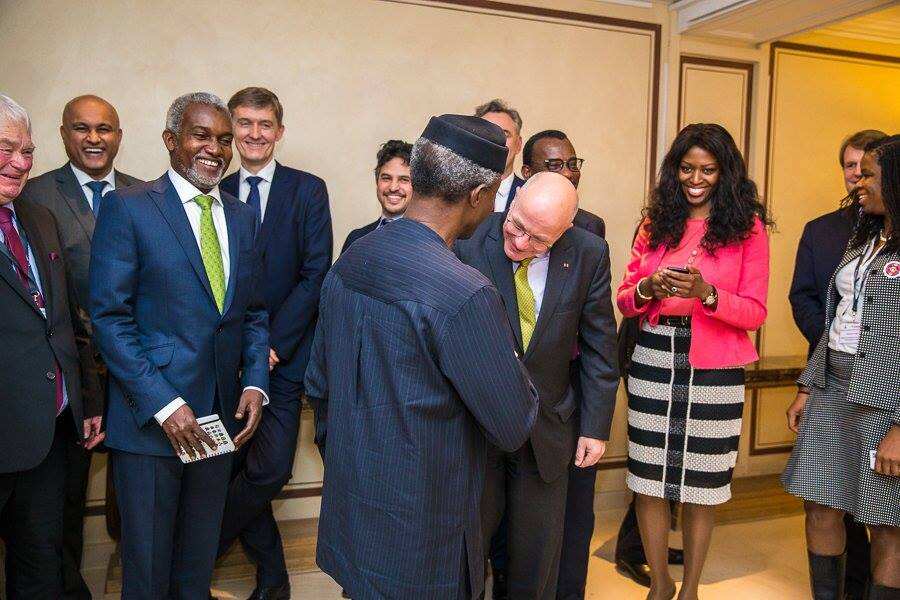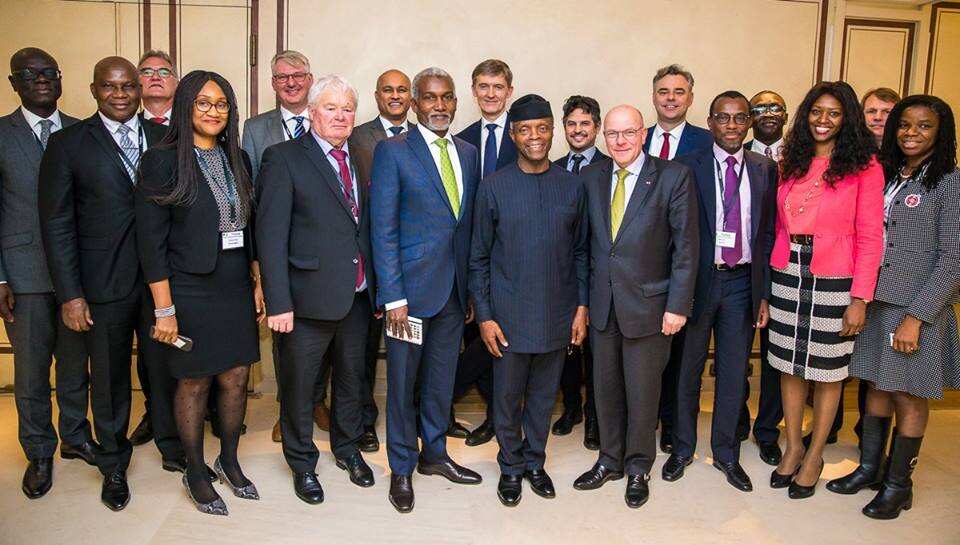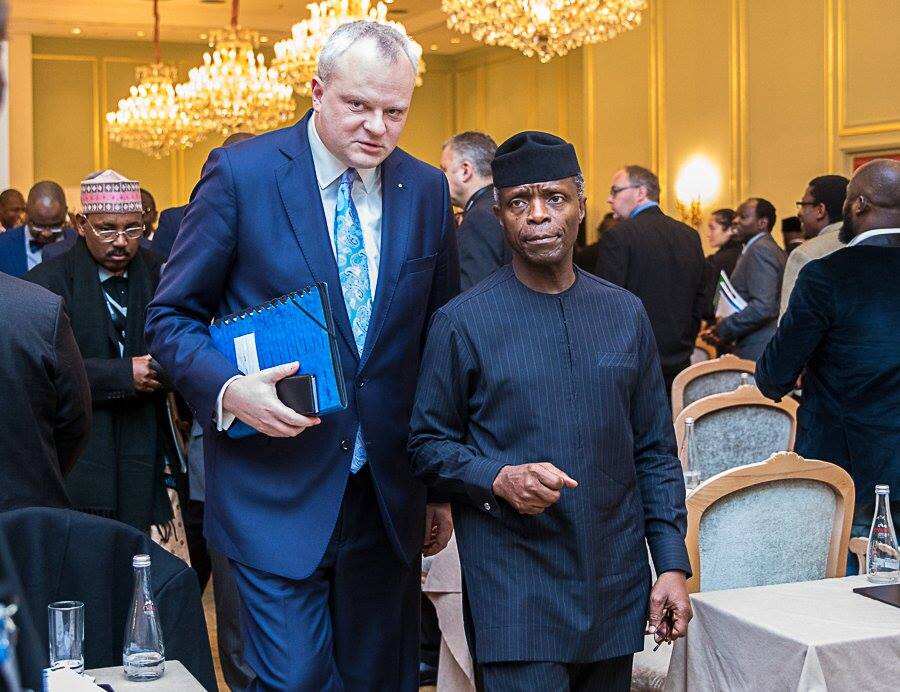- Vice President Yemi Osinbajo had a town hall meeting with Nigerians in Germany on Monday, December 10
- According to the vice president's aide, Laolu Akande, Osinbajo interacted with the people of Nigeria and answered their questions
- The vice president, who had about 30 questions tabled before him, said grand corruption is Nigeria’s greatest problem
- He said there is no country in the world that can survive if its resources are stolen the way Nigeria’s resources are stolen
Upon his arrival in Berlin, Germany, Vice President Yemi Osinbajo held a town hall meeting with the Nigerian community in that country.
Legit.ng gathers that the disclosure was made by Laolu Akande, the senior special assistant on media and publicity to the vice president.
Akande, who took to his official Twitter page to make the disclosure, said about 30 questions were tabled as VP began to interact with the people of Nigeria.
See tweet below:
According to Akande, Osinbajo says the problem with Nigeria is not about resources or planning, but the poor management of resources in the past, NAN reports.

The vice president headlined the Nigerian-German Business Dialogue in Berlin on Monday, December 10. Facebook, Aso Rock Villa.
READ ALSO: NAIJ.com upgrades to Legit.ng: a letter from our Editor-in-Chief Bayo Olupohunda
Fielding questions from a cross section of Nigerians in Germany on Sunday night, December 9, Osinbajo said that those who made away with the nation’s resources should be made to account for it.

Vice President Yemi Osinbajo says is no country in the world that can survive if its resources are stolen the way Nigeria’s resources are stolen. Photo credit: Facebook, Aso Rock Villa.
In a statement by Akande on Monday, December 10, Osinbajo said that to move forward, such massive corruption should not be allowed again.
He said: “The greatest problem Nigeria has is one of grand corruption; that is the biggest problem we have; not the problem of planning or plans; and grand corruption is the reason why we are not moving as fast as we should in our country.

Vice President Yemi Osinbajo in Berlin, Germany. Photo credit: Facebook, Aso Rock Villa.
“There is no country in the world that can survive if its resources are stolen the way Nigeria’s resources are stolen.’’
The vice president said that most of the issues raised by the Nigerians in Diaspora at the meeting over lack of energy, infrastructure, quality and extensive health care services, education and security were traceable to the management of resources.
He called on Nigerians to hold leaders accountable for the nation’s wealth.
Osinbajo stated that one of the key issues the President Muhammadu Buhari’s administration was dealing with in partnership with European leaders was the repatriation of the country’s stolen assets stashed abroad.
He said that the federal government was equally having conversations with European countries on the subject of migration of Nigerians to Europe.
The vice president told the gathering that government was concerned about migration issue and had started negotiating with European countries.
He added that European countries could partner with Nigeria by investing in the country, thereby discouraging the prevalent migration of young people.
Explaining federal government’s efforts at addressing unemployment challenges, the vice president observed that a young population of about 60% created a yearly addition of about 1.4 million graduates to the unemployment market.
On healthcare delivery services to majority of Nigerians, Osinbajo agreed on the need to extend good healthcare to all Nigerians, but pointed out that it could only be achieved through compulsory health insurance policy.
Underscoring the urgent need to develop a functional educational system, the vice president announced that the Buhari-led administration was developing a robust education policy, saying “education is the basis of all we’re doing.”
The ambassadors of Nigeria to Germany, France, Italy, Switzerland and Belgium were all part of the audience.
Legit.ng previously reported that the presidency said in a statement on Sunday, December 9, that Osinbajo would address a group of notable German business leaders in Berlin, Germany, on Monday, December 10.
In a statement in Abuja, Laolu Akande said Osinbajo would speak on the potential of the Nigerian market. He said that Osinbajo would also speak on the gains recorded by the country through its Ease of Doing Business reforms.
“The President Muhammadu Buhari administration’s Ease of Doing Business reforms have helped in improving the country’s ranking in the World Bank’s Doing Business Index 2017, where Nigeria climbed up 24 places and was listed among the 10 most reformed economies globally.
PAY ATTENTION: Install our latest app for Android, read best news on Nigeria’s #1 news app
“Also, the World Bank noted that Nigeria made significant progress across several indicators; including starting a business, dealing with construction permits, getting electricity, registering property, getting credit, protecting minority investors, paying taxes, trading across borders, enforcing contracts, and resolving insolvency."
NAIJ.com (naija.ng) -> Legit.ng We have updated to serve you better
Leadership of Nigeria is not meant for our forefathers| Legit TV
Source: Legit.ng
from Nigeria News today & Breaking Naija news ▷ Read on LEGIT.NG 24/7 https://ift.tt/2QIbk6u
via EDUPEDIA24/7
Comments
Post a Comment